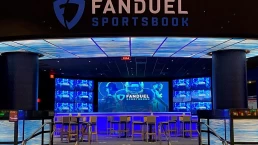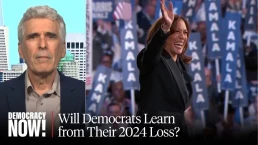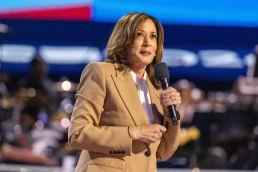The industry aims to expand its reach this election season by promising revenue windfalls and downplaying evidence their services are a bad bet.
By Amos Barshad, The Lever
In early May, on a blue-sky day in Jefferson City, Missouri’s Secretary of State’s Office had a few unlikely visitors: Louie the blue bear, Fredbird the cardinal, and Sluggerrr the lion, some of the state’s furriest, most beloved mascots.

They were there to represent the professional sports teams in Missouri, all backers of Amendment 2, a ballot measure that would legalize sports gambling in Missouri and use corresponding tax revenue to fund education. After clowning around for news cameras and smashing high-fives, the anthropomorphic animals used hand trucks to roll file boxes of signatures in support of Amendment 2 into the office themselves.
Direct democracy, mascots, money for kids: it all seemed wholesome. But critics of Amendment 2 say Sluggerrr and his friends had been weaponized that day by corporate gambling interests making false promises about school funding. “They frame it as ‘Let the people vote,’” said Les Bernal, the National Director of the advocacy group Stop Predatory Gambling, “but there’s no grassroots movement. There is a very specific, very coordinated campaign to ram through hard-core versions of gambling.”
Along with Missouri’s sports teams, the campaign for Amendment 2 is backed by FanDuel and DraftKings, two of the biggest sports gambling companies in the United States. Collectively, those two companies alone have spent more than $36 million boosting Amendment 2.
Following a 2018 Supreme Court decision lifting long-standing gambling restrictions, 38 states have legalized sports betting, which allows consumers to wager money on the outcomes of sports from basketball to professional darts. Thanks to the successful signature drive, Missouri will vote on Nov. 5 on whether to become number 39.
Recent Posts
“We’re Going to Run the Country:” Preparing an Illegal Occupation in Venezuela
January 4, 2026
Take Action Now Under international law, nothing described in that press conference is legal. The UN Charter prohibits the threat or use of force…
‘The Actions of a Rogue State’: US Lawmakers Demand Emergency Vote to Stop Trump War on Venezuela
January 3, 2026
Take Action Now “Trump has no right to take us to war with Venezuela. This is reckless and illegal,” said Rep. Greg Casar. “Congress should vote…
“The Blue Road To Trump Hell”: Norm Solomon On “How Corporate Democrats Paved The Way For Autocracy”
December 31, 2025
Take Action Now “If you don’t examine real history, then you’re in a cycle that repeats the same problems,” says Norman Solomon, director of…
Why is the Democratic party hiding its 2024 autopsy report?
December 30, 2025
Take Action Now If the DNC isn’t open and transparent about why they lost, then how can we be sure they will learn their lesson this time?By…




